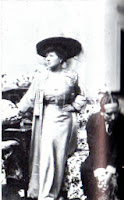Penelope - W. Somerset Maugham
 |
| Penelope by W. Somerset Maugham |
Penelope. A Comedy in Three Acts (London: Heinemann,1912)
We are going to look at one of W. Somerset Maugham's plays, Penelope, and the first published edition in this post.
Maugham the Playwright: Penelope
I am not very familiar with Maugham's plays; I have read but one or two of his later plays long time ago without paying much attention.
 |
| Marie Tempest & Graham Browne in Penelope |
Penelope, on the contrary, I find immensely entertaining. I read some contemporary reviews and it was very successful when it was first produced at the Comedy Theatre in 1909 with Marie Tempest and Graham Browne as leads, and Ethelwyn Arthur Jones (Maugham's lover for eight years and the model for Rosie in Cakes and Ale) as Peyton the butler-like maid.
 |
| Ethelwyn Arthur Jones as Peyton |
The story is simple, basically about the strategems that Penelope employs to regain the love of her husband, who has been having an affair with an attractive married woman. Nonetheless, it is full of sarcastic observations on marriage and love and social status, which could make some people squirm in their seats. True to her namesake, Penelope's patient sacrifice is rewarded and the husband returned. The last line is superb; I can well imagine the riotous laughter it must have provoked when the curtains drew.
However, despite the light-heartedness, there is something immensely sad underneath, which is dramatized at the end of the first act when Penelope bursts into tears. Her love is straightforward and her affection for Dickie true and simple, but in order to see her love returned, she has to use such roundabout strategies that destroy any chance of spontaneity. It is a terribly sad message indeed.
Penelope reminds one of other Maugham's heroines, such as Bertha in Mrs Craddock and Julia at the beginning in Theatre, who love with such a passion that they are drained completely at the end by the unrequited love, unrequited in the sense that the same level of passion is not returned by the other party. In Penelope and Theatre, this is treated with humour and acceptance, because it seems that there is no other alternative.
Penelope: First Edition
The play was written in 1908 originally titled Man and Wife, produced first in January 1909, and published in 1912. The Heinemann edition was published one month before the American (The Dramatic Publishing Co.), and later there was a Doran reprint.
The book does not state itself as first edition. What I checked was the sequence of the pages as described in Stott. For the Heinemann edition there are the two usual bindings, described as "cherry red buckram" (more expensive) and "champagne wrappers" (cheaper). Mine is the latter, with notice of a price raise and coffee/tea stains on it.
Cheap Maugham's first edition plays are hard to come by, as I assume the copies are scarce. Mine has a few uncut leaves at the beginning. It always gives me a queer feeling to cut pages of books, with my own hands, a hundred years old. This reminds me of one of Paul Laurence Dunbar's sonnets:
ON AN OLD BOOK WITH UNCUT LEAVES
Emblem of blasted hope and lost desire,
No finger ever traced thy yellow page
Save Time’s. Thou hast not wrought to noble rage
The hearts thou wouldst have stirred. Not any fire
Save sad flames set to light a funeral pyre
Dost thou suggest. Nay,—impotent in age,
Unsought, thou holdst a corner of the stage
And ceasest even dumbly to aspire.
How different was the thought of him that writ.
What promised he to love of ease and wealth,
When men should read and kindle at his wit.
But here decay eats up the book by stealth,
While it, like some old maiden, solemnly,
Hugs its incongruous virginity!
Most of Maugham's plays are available as ebooks, please visit the free ebook - Maugham's plays to read the full text.
Penelope at AbeBooks

Great post. I always feel that Maugham's play is a little bit old times. Full of the humour and farce that are workable in that time but not now.
ReplyDeleteAbout the edition. This one may be an earlier reprint. When you enlarge the picture of the first item on the Abebooks link you offered, you can find that the original price for soft cover is 1/6, not 2/0. The price was later increased to 2/.due to the cost. Maugham's play is quite difficult to identify for the first edition. I came across some but still not 100% sure.
Thanks for reading my post and taking the time to comment.
DeleteThe copy I have has a sticker about the price raise pasted on the cover, in the place where the original price was listed; because of that, I would tend to think that it was a remainder being sold together with the reprint of a higher price. I haven't seen a reprint, and I wonder if there are other telling differences to distinguish one from the other.
You are right about the edition. My copy is the same as yours with a notice pasted on the cover. I can see under the notice that the book was priced as 1/6. But my copy is neatly cut(machine cut?).There is no sign of paper that needs trim. Is it possible that there are differences between the same edition that one is machine cut and the other one is untrimmed?
DeleteThe earliest play that has the sticker of price raise described in Stott is _Smith_. After that, the plays were priced differently. As for the edges, it does say that all edges are cut. Mine had the uncut pages at the very beginning and the rest is, as you say, machine cut. It would be interesting to find out more about these little differences in different stages of printing.
Delete